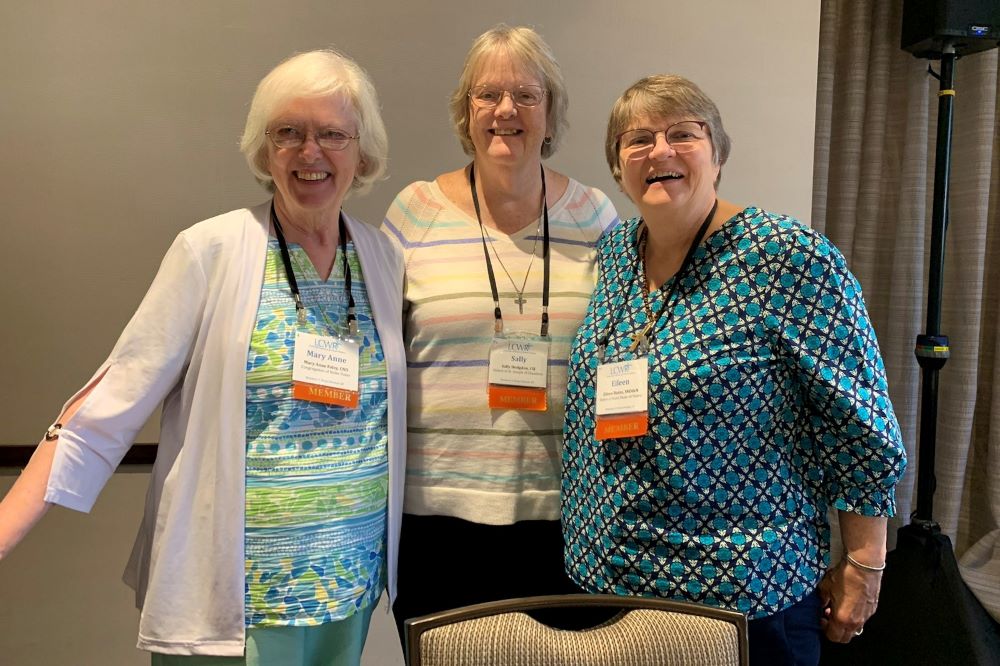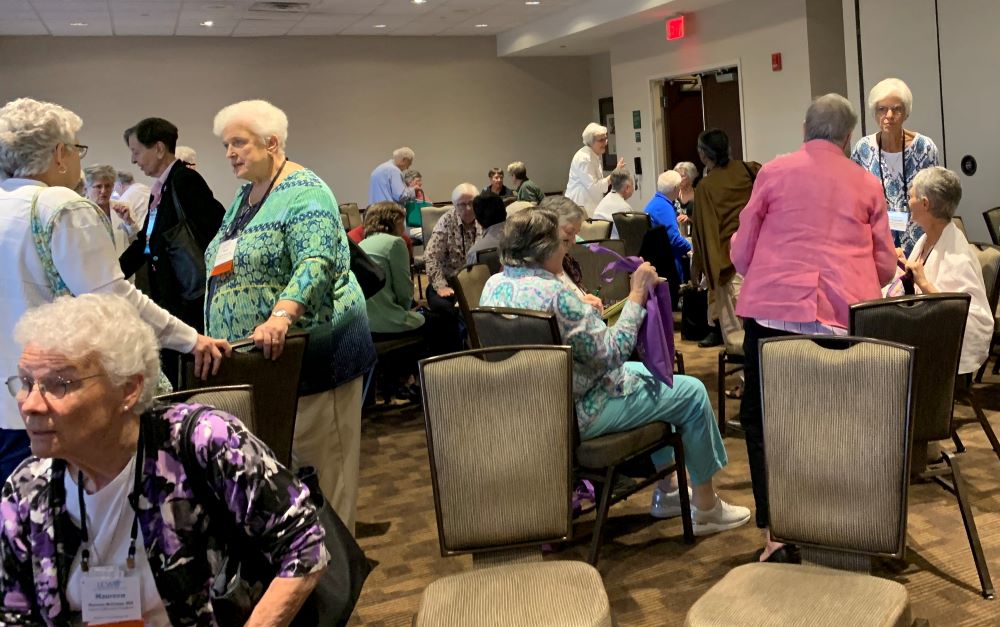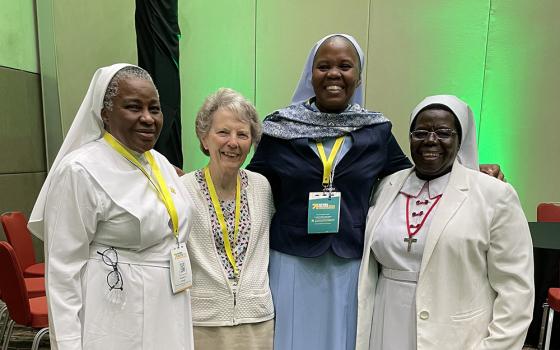
The breakout session on international congregations was led by, from left: Sr. Mary Anne Foley, Congregation de Notre Dame; Sr. Sally Hodgdon, Sisters of Saint Joseph of Chambéry; and Sr. Eileen Burns, Sister of Notre Dame de Namur.
The eight breakout sessions at the Leadership Conference of Women Religious this year were all valuable, so it was hard to choose only one to attend. I was interested in several, but my work as international liaison for Global Sisters Report helped me decide.
Nearly every day, I am in communication with sisters all over the world by email, phone or WhatsApp. Sisters are members of canonically international congregations and some, though locally founded, share similar international issues if their sisters are missioned elsewhere other than in the country of their foundation. There were two sessions for each breakout session, one morning and one afternoon. During the first session, as I listened to the leaders, I identified with both the blessings and challenges of international relationships.
My own congregation, Sisters of the Presentation of the Blessed Virgin Mary, is not technically international, but we are part of a worldwide order founded by Nano Nagle in 1775 in Ireland. There are two regions of independent congregations, North America and Australia/Papua New Guinea, and a Union-based one in Ireland. Altogether, we are in 16 countries.
These three groups formed an international association in 1988 and representatives from each meet together every five years to foster and strengthen our shared charism, spiritual identity and mission. I recently had the privilege of participating in such a meeting in Newfoundland and have been named to the membership board of the international association.
The facilitators of the international group led two sessions of 10 or 12 circles with 7 or 8 participants in each. Some groups were culturally diverse and one was for Spanish-speaking women.

Leaders gather to discuss international congregations in a breakout session at the Leadership Conference of Women Religious Aug. 10 in Dallas (GSR photo/Joyce Meyer)
In the first session, we were asked to reflect together on the blessings of belonging to and being leaders of international groups. Blessings were many and as we shared, we expressed gratitude for them in our lives. The leaders spoke of the richness of global awareness gained from being part of an international group, the histories of congregational units shaped by varieties of cultures, beautiful and engaging expressions, verbal or other, of charism and spirituality, the zeal and commitment for mission expressed and interpreted by different cultures.
Leaders spoke about how the diversity of language and culture invited them to witness the way Gospel and charism values are understood culturally and enfleshed differently. They spoke of the joy of relationships that grow across the boundaries of language and culture. Blessings also included opportunities to travel to places a person might never have imagined, having an "enlarged heart," of finding a sense of "being at home," even in different contexts, and learning how to discern and work together because of shared passion and values of the congregation.
When we were asked to reflect together on the challenges of membership and leadership internationally, we realized that sometimes the blessings named also brought challenges. Yes, we may share the same constitutions, but the multiplicity of language can bring different understandings of the words and therefore misunderstandings and judgements. Living internationally in different time zones means there is no such thing as a "common time" and definite agreement that time is also lived differently in diverse cultures. There are different understandings of authority and accountability depending on whether we are from individual focused cultures or communal focused ones.
Leaders spoke of how easy it can be to slip into stereotyping one another and therefore make wrong judgments. Education levels can greatly impact members' expectations and assumptions about what "should" be understood or understood as "common sense." Different cultural lifestyles impact food, how it is cooked, smells and even eaten, on clothing, what is appropriate or not, and on behavior and relationships. There is the challenge of racism and unconscious or unreflected biases that can divide. Younger communities of a congregation may feel left out in a "north" focus on completion, when instead, their interest is on future development. Congregational restructuring into heterogeneous groups of provinces or units where members were more culturally homogenous requires new ways of living together when units are combined.
It takes energy and intentional commitment adapting to a diversity of culture and language. Declining numbers of sisters in the north may feel a "loss of voice" that they had as dominant groups; it may also bring realization of how other sisters may have felt when in the minority. Some noted a sense of losing power and even fear when leadership changes from Global North to Global South. Related to this are differences in attitudes toward money and resources as power shifts from a dominant group to the other. There are also fears of dwindling resources that will impact future development.
I was touched and inspired by the openness and vulnerability as sisters shared both blessings and challenges. In the afternoon session, the groups shared ways they are learning to navigate some of these challenges. To me, they revealed creativity and helpful insights for all of us to think about for our own groups.
Diversity of language has been and is being navigated in a variety of ways. For some congregations, every sister must learn the language of the country in which it was founded. For others, if there are two dominant languages, every sister is required to learn both; if more, everyone needs to learn at least two languages.
Advertisement
Zoom has become a common tool to help foster quicker communication from leaders to congregation and to build relationships and cultural education from one unit to another. It has also increased the degree of participation in congregational committees. Relationship building across cultures is also encouraged by travel, short times of intercultural living, personnel exchanges, study in other countries, heritage retreats, diversity, equity and inclusion training, education regarding the meaning of the missionary vocation, storytelling online and having general assemblies or leadership meetings in different countries.
One that really was eye-opening for me was hearing from one congregation that every unit was asked to open their finance accounts to one another to see who has money and who does not. It helped them address the equity issue regarding resources.
There is rarely enough time for surfacing all the blessings, challenges and navigation at one or two sittings. Therefore, LCWR plans to provide future virtual meetings for those interested in pursuing all three areas more fully.
For me, the sessions were definitely only a beginning because of the diversity of how international congregations are organized. Yes, there are canonical structures that are similar, but how these structures operate can be very different. These sessions only scratched the surface of identifying and articulating the richness of this diversity and touching deeper levels of feelings and assumptions. Leaders perhaps experience this more than the membership, but I think all agree that just hearing some of the navigation skills can help open up new avenues of coming to the communion that our hearts long for and want to witness in our often divided worlds.








